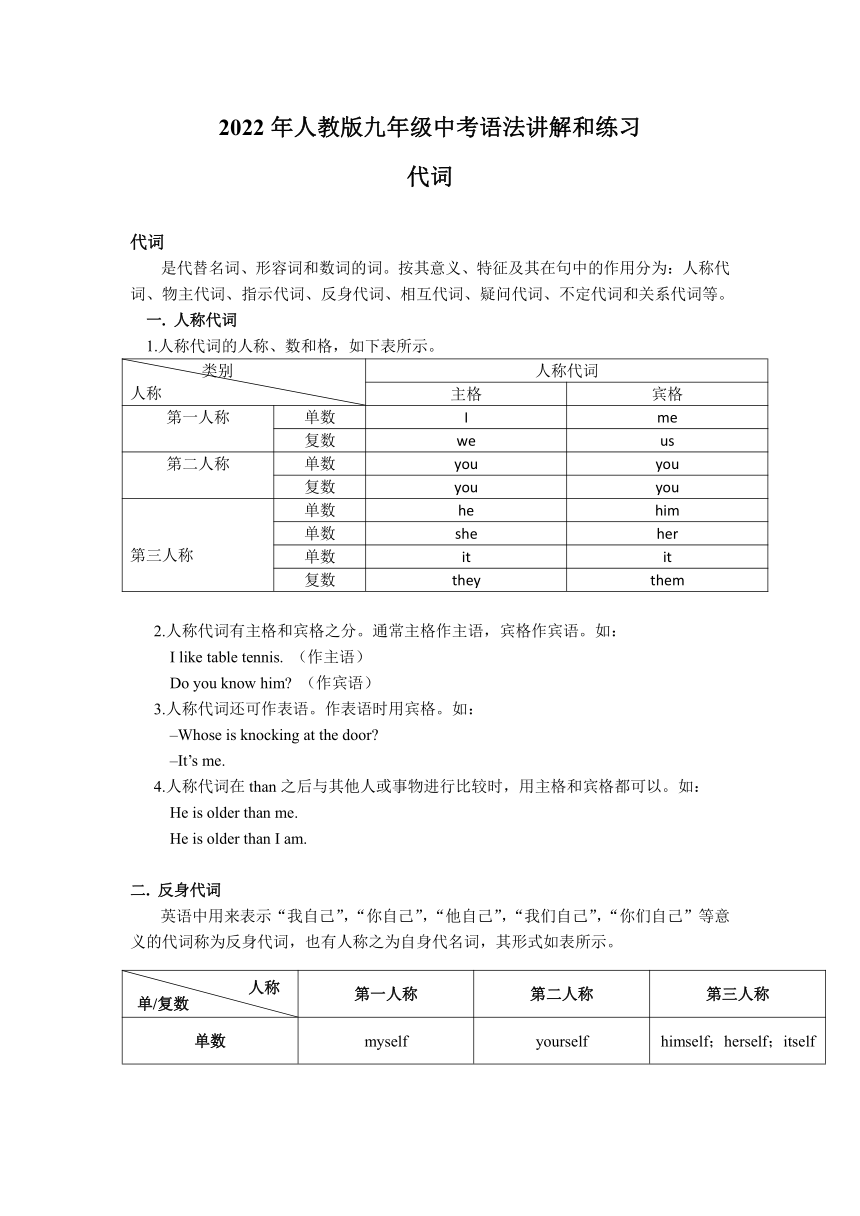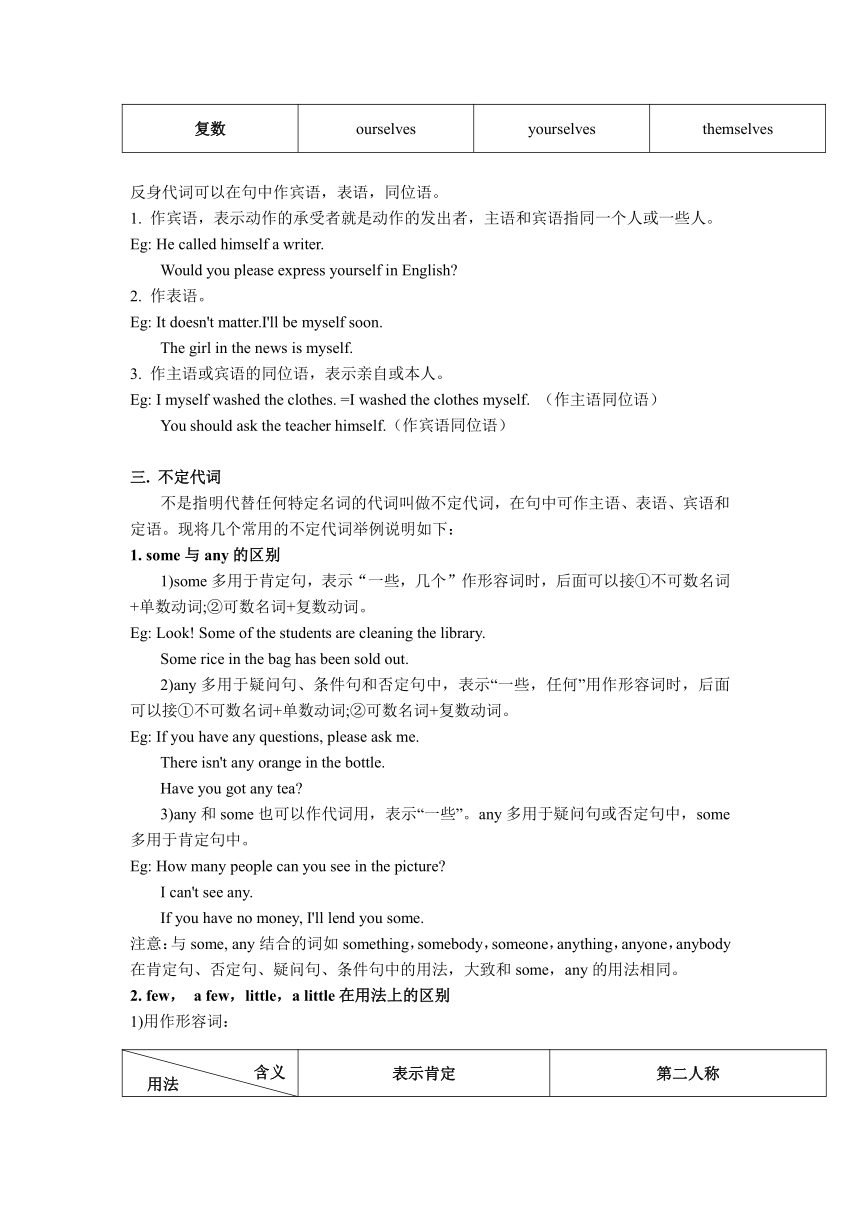2022年人教版中考英语语法讲解和练习——代词(无答案)
文档属性
| 名称 | 2022年人教版中考英语语法讲解和练习——代词(无答案) |  | |
| 格式 | zip | ||
| 文件大小 | 31.0KB | ||
| 资源类型 | 教案 | ||
| 版本资源 | 人教新目标(Go for it)版 | ||
| 科目 | 英语 | ||
| 更新时间 | 2022-04-04 17:17:04 | ||
图片预览


文档简介
2022年人教版九年级中考语法讲解和练习
代词
代词
是代替名词、形容词和数词的词。按其意义、特征及其在句中的作用分为:人称代词、物主代词、指示代词、反身代词、相互代词、疑问代词、不定代词和关系代词等。
一. 人称代词
1.人称代词的人称、数和格,如下表所示。
类别 人称 人称代词
主格 宾格
第一人称 单数 I me
复数 we us
第二人称 单数 you you
复数 you you
第三人称 单数 he him
单数 she her
单数 it it
复数 they them
2.人称代词有主格和宾格之分。通常主格作主语,宾格作宾语。如:
I like table tennis. (作主语)
Do you know him (作宾语)
3.人称代词还可作表语。作表语时用宾格。如:
–Whose is knocking at the door
–It’s me.
4.人称代词在than之后与其他人或事物进行比较时,用主格和宾格都可以。如:
He is older than me.
He is older than I am.
二. 反身代词
英语中用来表示“我自己”,“你自己”,“他自己”,“我们自己”,“你们自己”等意义的代词称为反身代词,也有人称之为自身代名词,其形式如表所示。
第一人称 第二人称 第三人称
单数 myself yourself himself;herself;itself
复数 ourselves yourselves themselves
反身代词可以在句中作宾语,表语,同位语。
1. 作宾语,表示动作的承受者就是动作的发出者,主语和宾语指同一个人或一些人。
Eg: He called himself a writer.
Would you please express yourself in English
2. 作表语。
Eg: It doesn't matter.I'll be myself soon.
The girl in the news is myself.
3. 作主语或宾语的同位语,表示亲自或本人。
Eg: I myself washed the clothes. =I washed the clothes myself. (作主语同位语)
You should ask the teacher himself.(作宾语同位语)
三. 不定代词
不是指明代替任何特定名词的代词叫做不定代词,在句中可作主语、表语、宾语和定语。现将几个常用的不定代词举例说明如下:
1. some与any的区别
1)some多用于肯定句,表示“一些,几个”作形容词时,后面可以接①不可数名词+单数动词;②可数名词+复数动词。
Eg: Look! Some of the students are cleaning the library.
Some rice in the bag has been sold out.
2)any多用于疑问句、条件句和否定句中,表示“一些,任何”用作形容词时,后面可以接①不可数名词+单数动词;②可数名词+复数动词。
Eg: If you have any questions, please ask me.
There isn't any orange in the bottle.
Have you got any tea
3)any和some也可以作代词用,表示“一些”。any多用于疑问句或否定句中,some多用于肯定句中。
Eg: How many people can you see in the picture
I can't see any.
If you have no money, I'll lend you some.
注意:与some, any结合的词如something,somebody,someone,anything,anyone,anybody在肯定句、否定句、疑问句、条件句中的用法,大致和some,any的用法相同。
2. few, a few,little,a little在用法上的区别
1)用作形容词:
表示肯定 第二人称
用于可数名词 a few 虽少,但有几个 few 不多,几乎没有
用于不可数名词 a little 虽少,但有一点 little 不多,没有什么
表示肯定:
Eg: I'm going to buy a few apples.
He can speak only a little Chinese.
There is only a little milk in the glass.
表示否定:
Eg: He has few friends.
They had little money with them.
2)a little和little也可以用作副词,a little表示“有点,稍微”,little表示“很少”。
Eg: I'm a little hungry. (修饰形容词hungry)
Let him sleep a little. (修饰动词sleep)
Mary, go a little faster, please. (修饰副词比较级)
She slept very little last night.
3. other,the other,another,others,the others的区别。
1)other可以作形容词用,后面可以跟单数或复数名词,“其他的、别的”。
Eg: Where are his other books
I haven't any other books except this one.
2)other也可以用作代词,与冠词the连用构成“the other”,表示两个人或物中的“另一个”。常与one搭配构成“one…, the other …”句型。
Eg: He has two brothers. One is 10 years old , the other is 5 years old.
She held a ruler in one hand and an exercise-book in the other.
3)other作代词用时,可以有复数“others”,泛指“另外的人或物”。常与some搭配构成“some…, others…”句型。
Eg: Some went to the cinema, others went swimming.
This coat is too large. Show me some others, please.
4)“the others”表示特指某范围内的“其他的人或物”。
Eg: We got home by 4 o'clock, but the others didn't get back until 8 o'clock.
In our class only Tom is English, the others are Chinese.
5)another可以作形容词用,修饰后面的名词,意为“另一个”,还可以跟代词one.
Eg: You can see another ship in the sea, can't you
Mary doesn't want to buy this skirt. Would you please show her another one
6)another也可以作代词用,表示“另一个”。
Eg: I'm still hungry after I've had this cake. Please give me another.
4.表两者的不定代词:both(两者都,后跟复数),either(两者中任何一个,后跟单数),neither(两者中没有一个,后跟复数)
5.表三者的不定代词:all(三者或以上都,后跟复数),each(两者或以上任何一个,后跟单数)none(三者或以上没有一个,后跟单数或复数)
6.many 和much的区别:many+可数名词复数,much+不可数名词
7.形容词修饰不定代词时要放在不定代词后面,如something important ,somewhere warm
8.it和one 的区别:it指的是上面提到的同一物,one指的是上面提到的同类物中的一个。
9.与how有关的常用短语。
“how often”提问时,答语一般用“twice a day,sometimes,often”等表频率的词。
“how soon”提问时,答语一般用“in +一段时间”
“how long”提问时,答语一般用“for +一段时间或since+时间点”
“how far”提问路程,答语一般用“10 kilometers / 20 minutes’ walk等”
“how far”用来提问年龄,答语一般用“…years old.”
四. 疑问代词
疑问代词有who,whom,whose,what和which等。疑问代词用于特殊疑问句中,一般都放在句首,并在句子中作为某一句子成分。
【对点专练】:
( ) 1.The song I Believe I Can Fly tells us that believing in _______ is very important.
A. themselves B. itself C. ourselves D. yourselves
( ) 2.In our school, ____ students like English, but ____ of them can speak English smoothly.
A. a little; a few B. a few; few C. a few, little D. a little; few
( ) 3. –Which of the two magazines will you take
–I’ll take ______ though I find ______ of them are very useful to me.
A. all; both B. either; either C. either; neither D. either; both
( ) 4. –Susan, go and join your sister in cleaning the yard.
–Why ______ John is sitting there doing nothing at all.
A. I B. me C. myself D. mine
( ) 5. –This book on idioms is interesting. I’d like ______, where did you buy it, Simon
–In the Amazon Bookstore,
A. it B. this C. that D. One
( ) 6.We have friends to help us fight against pollution, and trees are one of ________.
A. themselves B. they C. their D. them
( ) 7._______of us wants to go to the park today, because we have to finish so much homework.
A. Either B. Both C. Neither D.All
( ) 8.My sister is old enough to dress ______ now.
A. himself B. herself C. myself D.yourself
( ) 9.Do you have toys I’d like to buy ______ for my cousin.
A. it B. one C. This D. that
( ) 10.We must protect plants. They are friends of ______.
A. we B. us C. our D. ours
( ) 11.You can take _____ of the two toy cars and leave the other for your brother.
A. both B. none C. either D. neither
( ) 12.Help ________ to some fish, Jeff.
A. you B. your C. yours D. yourself
( ) 13.At present, children mean _______ to most parents in China.
A. everything B. nothing C. anything D. something
( ) 14.—Would you like tea or coffee —______, thanks! I’d prefer a coke.
A. Both B. Neither C. All D. Some
( ) 15.I made a call to my parents yesterday, but _______ of them answered it.
A. either B. none C. neither D. nobody
代词
代词
是代替名词、形容词和数词的词。按其意义、特征及其在句中的作用分为:人称代词、物主代词、指示代词、反身代词、相互代词、疑问代词、不定代词和关系代词等。
一. 人称代词
1.人称代词的人称、数和格,如下表所示。
类别 人称 人称代词
主格 宾格
第一人称 单数 I me
复数 we us
第二人称 单数 you you
复数 you you
第三人称 单数 he him
单数 she her
单数 it it
复数 they them
2.人称代词有主格和宾格之分。通常主格作主语,宾格作宾语。如:
I like table tennis. (作主语)
Do you know him (作宾语)
3.人称代词还可作表语。作表语时用宾格。如:
–Whose is knocking at the door
–It’s me.
4.人称代词在than之后与其他人或事物进行比较时,用主格和宾格都可以。如:
He is older than me.
He is older than I am.
二. 反身代词
英语中用来表示“我自己”,“你自己”,“他自己”,“我们自己”,“你们自己”等意义的代词称为反身代词,也有人称之为自身代名词,其形式如表所示。
第一人称 第二人称 第三人称
单数 myself yourself himself;herself;itself
复数 ourselves yourselves themselves
反身代词可以在句中作宾语,表语,同位语。
1. 作宾语,表示动作的承受者就是动作的发出者,主语和宾语指同一个人或一些人。
Eg: He called himself a writer.
Would you please express yourself in English
2. 作表语。
Eg: It doesn't matter.I'll be myself soon.
The girl in the news is myself.
3. 作主语或宾语的同位语,表示亲自或本人。
Eg: I myself washed the clothes. =I washed the clothes myself. (作主语同位语)
You should ask the teacher himself.(作宾语同位语)
三. 不定代词
不是指明代替任何特定名词的代词叫做不定代词,在句中可作主语、表语、宾语和定语。现将几个常用的不定代词举例说明如下:
1. some与any的区别
1)some多用于肯定句,表示“一些,几个”作形容词时,后面可以接①不可数名词+单数动词;②可数名词+复数动词。
Eg: Look! Some of the students are cleaning the library.
Some rice in the bag has been sold out.
2)any多用于疑问句、条件句和否定句中,表示“一些,任何”用作形容词时,后面可以接①不可数名词+单数动词;②可数名词+复数动词。
Eg: If you have any questions, please ask me.
There isn't any orange in the bottle.
Have you got any tea
3)any和some也可以作代词用,表示“一些”。any多用于疑问句或否定句中,some多用于肯定句中。
Eg: How many people can you see in the picture
I can't see any.
If you have no money, I'll lend you some.
注意:与some, any结合的词如something,somebody,someone,anything,anyone,anybody在肯定句、否定句、疑问句、条件句中的用法,大致和some,any的用法相同。
2. few, a few,little,a little在用法上的区别
1)用作形容词:
表示肯定 第二人称
用于可数名词 a few 虽少,但有几个 few 不多,几乎没有
用于不可数名词 a little 虽少,但有一点 little 不多,没有什么
表示肯定:
Eg: I'm going to buy a few apples.
He can speak only a little Chinese.
There is only a little milk in the glass.
表示否定:
Eg: He has few friends.
They had little money with them.
2)a little和little也可以用作副词,a little表示“有点,稍微”,little表示“很少”。
Eg: I'm a little hungry. (修饰形容词hungry)
Let him sleep a little. (修饰动词sleep)
Mary, go a little faster, please. (修饰副词比较级)
She slept very little last night.
3. other,the other,another,others,the others的区别。
1)other可以作形容词用,后面可以跟单数或复数名词,“其他的、别的”。
Eg: Where are his other books
I haven't any other books except this one.
2)other也可以用作代词,与冠词the连用构成“the other”,表示两个人或物中的“另一个”。常与one搭配构成“one…, the other …”句型。
Eg: He has two brothers. One is 10 years old , the other is 5 years old.
She held a ruler in one hand and an exercise-book in the other.
3)other作代词用时,可以有复数“others”,泛指“另外的人或物”。常与some搭配构成“some…, others…”句型。
Eg: Some went to the cinema, others went swimming.
This coat is too large. Show me some others, please.
4)“the others”表示特指某范围内的“其他的人或物”。
Eg: We got home by 4 o'clock, but the others didn't get back until 8 o'clock.
In our class only Tom is English, the others are Chinese.
5)another可以作形容词用,修饰后面的名词,意为“另一个”,还可以跟代词one.
Eg: You can see another ship in the sea, can't you
Mary doesn't want to buy this skirt. Would you please show her another one
6)another也可以作代词用,表示“另一个”。
Eg: I'm still hungry after I've had this cake. Please give me another.
4.表两者的不定代词:both(两者都,后跟复数),either(两者中任何一个,后跟单数),neither(两者中没有一个,后跟复数)
5.表三者的不定代词:all(三者或以上都,后跟复数),each(两者或以上任何一个,后跟单数)none(三者或以上没有一个,后跟单数或复数)
6.many 和much的区别:many+可数名词复数,much+不可数名词
7.形容词修饰不定代词时要放在不定代词后面,如something important ,somewhere warm
8.it和one 的区别:it指的是上面提到的同一物,one指的是上面提到的同类物中的一个。
9.与how有关的常用短语。
“how often”提问时,答语一般用“twice a day,sometimes,often”等表频率的词。
“how soon”提问时,答语一般用“in +一段时间”
“how long”提问时,答语一般用“for +一段时间或since+时间点”
“how far”提问路程,答语一般用“10 kilometers / 20 minutes’ walk等”
“how far”用来提问年龄,答语一般用“…years old.”
四. 疑问代词
疑问代词有who,whom,whose,what和which等。疑问代词用于特殊疑问句中,一般都放在句首,并在句子中作为某一句子成分。
【对点专练】:
( ) 1.The song I Believe I Can Fly tells us that believing in _______ is very important.
A. themselves B. itself C. ourselves D. yourselves
( ) 2.In our school, ____ students like English, but ____ of them can speak English smoothly.
A. a little; a few B. a few; few C. a few, little D. a little; few
( ) 3. –Which of the two magazines will you take
–I’ll take ______ though I find ______ of them are very useful to me.
A. all; both B. either; either C. either; neither D. either; both
( ) 4. –Susan, go and join your sister in cleaning the yard.
–Why ______ John is sitting there doing nothing at all.
A. I B. me C. myself D. mine
( ) 5. –This book on idioms is interesting. I’d like ______, where did you buy it, Simon
–In the Amazon Bookstore,
A. it B. this C. that D. One
( ) 6.We have friends to help us fight against pollution, and trees are one of ________.
A. themselves B. they C. their D. them
( ) 7._______of us wants to go to the park today, because we have to finish so much homework.
A. Either B. Both C. Neither D.All
( ) 8.My sister is old enough to dress ______ now.
A. himself B. herself C. myself D.yourself
( ) 9.Do you have toys I’d like to buy ______ for my cousin.
A. it B. one C. This D. that
( ) 10.We must protect plants. They are friends of ______.
A. we B. us C. our D. ours
( ) 11.You can take _____ of the two toy cars and leave the other for your brother.
A. both B. none C. either D. neither
( ) 12.Help ________ to some fish, Jeff.
A. you B. your C. yours D. yourself
( ) 13.At present, children mean _______ to most parents in China.
A. everything B. nothing C. anything D. something
( ) 14.—Would you like tea or coffee —______, thanks! I’d prefer a coke.
A. Both B. Neither C. All D. Some
( ) 15.I made a call to my parents yesterday, but _______ of them answered it.
A. either B. none C. neither D. nobody
同课章节目录
- 词法
- 名词
- 动词和动词短语
- 动词语态
- 动词时态
- 助动词和情态动词
- 非谓语动词
- 冠词
- 代词
- 数词和量词
- 形容词副词及其比较等级
- 介词和介词短语
- 连词和感叹词
- 构词法
- 相似、相近词比较
- 句法
- 陈述句
- 一般疑问句和否定疑问句
- 特殊疑问句及选择疑问句
- 反意疑问句
- 存在句(There be句型)
- 宾语从句
- 定语从句
- 状语从句
- 主谓一致问题
- 简单句
- 并列句
- 复合句
- 主谓一致
- 主、表语从句
- 名词性从句
- 直接引语和间接引语
- 虚拟语气
- 感叹句
- 强调句
- 倒装句
- 祈使句
- 句子的成分
- 句子的分类
- 题型专区
- 单项选择部分
- 易错题
- 完形填空
- 阅读理解
- 词汇练习
- 听说训练
- 句型转换
- 补全对话
- 短文改错
- 翻译
- 书面表达
- 任务型阅读
- 语法填空
- 其他资料
